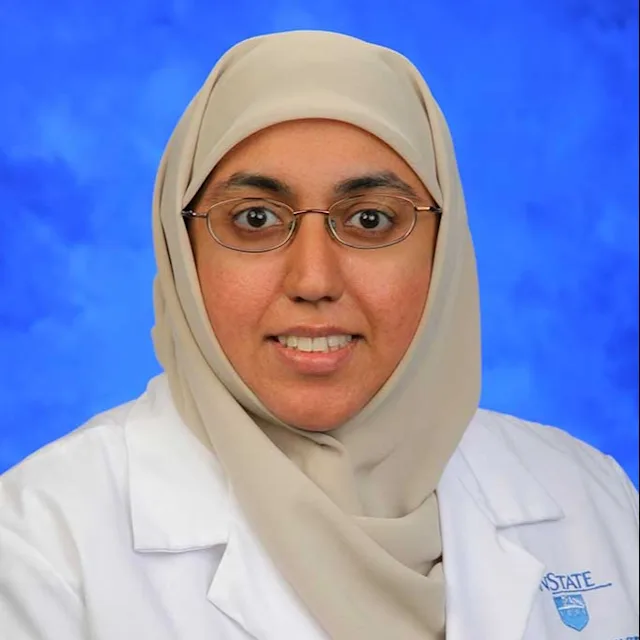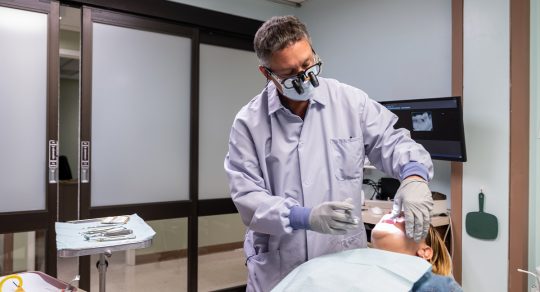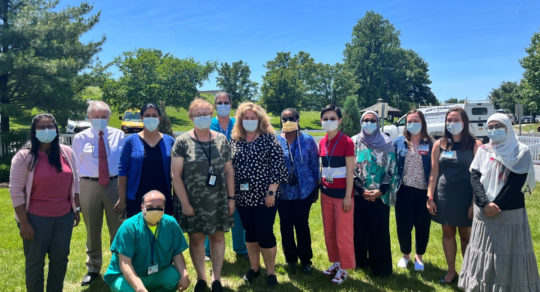Fellowship
Endocrinology, Diabetes and Metabolism
The Endocrinology, Diabetes and Metabolism Fellowship at Penn State Health Milton S. Hershey Medical Center is a two-year, ACGME-accredited fellowship that admits two fellows per year.
Explore More
The Division of Endocrinology and Diabetes, in the Department of Medicine at Penn State Health Milton S. Hershey Medical Center, is proud to offer a fellowship dedicated to preparing individuals for a career in the field of endocrinology. The design of the fellowship is to train physicians who are capable of practicing endocrinology in a variety of clinical and academic settings.

Program Overview
It is the program’s goal to achieve an optimal balance between clinical training, didactic learning and research activities.
Trainees will develop habits of lifelong learning to build upon their knowledge, skills and professionalism. The program is committed to enhancing the quality of life through improved health, the professional preparation of those who will serve the health needs of others and the discovery of knowledge that will benefit all.
Learn More About the Fellowship
To Apply
The Endocrinology, Diabetes and Metabolism Fellowship only accepts applications through ERAS, the Electronic Residency Application Service and participates in the National Residency Matching Program.
Each completed application, when received, is thoroughly evaluated by Division of Endocrinology and Diabetes faculty. A limited pool of applicants for interview is selected based upon evidence of superior academic credentials as documented in the written application. Out of the interviewed applicants, candidates are selected on the basis of their overall perceived academic potential, communication skills, motivation and integrity.
While all candidates will be considered, priority will be given to those pursuing academic endocrinology. Qualified candidates will have graduated from medical school, completed an internal medicine residency at an approved institution and submitted three letters of reference, and will be eligible for a Pennsylvania state medical license.
The program accepts J-1 visas only. The institution does not accept any other type of visa.
Leadership


Associate Professor, Medicine

Program Coordinator, Endocrinology, Diabetes and Metabolism Fellowship, Hematology/Oncology Fellowship and Interventional Pulmonology Fellowship, Medicine

Administrative Associate, Endocrinology, Diabetes and Metabolism Fellowship, Medicine
Supporting Your Training
Curriculum Details
The first year of the fellowship is primarily focused on clinical training. During this year, the fellow splits time between the inpatient consult service and the outpatient rotation.
Under the supervision of a faculty attending physician, the inpatient fellow assumes responsibility for all consultations in addition to teaching medical residents and students.
Consultation rounds take place daily with a team consisting of a faculty preceptor, the fellow, one or two medical residents, and one or two senior medical students.
This arrangement provides critical longitudinal experience in endocrine diseases, which are frequently chronic in nature.
During the months of outpatient rotation, the fellows participate in daily half-day, general endocrinology clinics where they see a wide range of endocrine patients under the mentorship of faculty members.
Fellows will also have their own continuity clinic on a weekly basis where they will see their own patients under the guidance of a faculty preceptor. Fellows will be responsible for the ongoing care of these patients.
During elective rotations, fellows participate in outpatient subspecialty clinics in pediatric endocrinology, lipid disorders, genetics, reproductive endocrinology, high-risk pregnancy, infertility clinic, endocrine surgery, nuclear medicine (including bone mineral density study) and radiology (focusing on ultrasound-guided fine needle aspiration/biopsy of thyroid).
During all rotations, fellows are expected to participate in regularly scheduled educational activities, which include weekly Clinical Endocrinology Conference and Medical Grand Rounds, monthly Diabetes Journal Club, and Endocrinology Research Conference every other month.
In addition to the above clinical and educational activities, the first-year fellow is expected to develop and initiate a research project with the assistance of an assigned faculty mentor.
The second year of training is divided between six months of clinical activity (alternating inpatient consults with outpatient clinics) and six months of elective time, including research.
Participation in the continuity outpatient clinic remains throughout the second year.
The option for a third year of training is available for those interested in academic research careers who need to prepare themselves as independent physician-scientists.
These fellows will be expected to apply to the NIH or an appropriate extramural funding agency/organization for a research fellowship.
Metabolism Fellowship.
Inpatient Consultation
Most of the fellows’ activity during the inpatient rotation is addressing consults from medicine, surgery and OB/GYN services. This activity provides a broad exposure to clinical endocrinology while allowing ample time for careful follow-up reading and teaching. In particular, the fellow is routinely involved in the perioperative management of glucose control in diabetic patients who have undergone coronary artery bypass surgery and in the postoperative follow-up of patients who have undergone various endocrine surgeries such as transsphenoidal surgery, parathyroid exploration, adrenalectomy, etc. A limited number of patients with specific endocrine diagnoses are admitted to the endocrine service; the vast majority are patients with thyroid cancer who are admitted for radioactive iodine therapy.
Outpatient Clinics
Experience in the outpatient setting is emphasized throughout the fellowship, since the majority of the endocrinology practice occurs in the ambulatory setting. During the outpatient rotation, the fellows participate in five half-day general endocrinology clinics per week. Although every patient is seen under the supervision of faculty attending physicians, the fellows are expected to assume a primary role in patient management and to follow individual patients until the next appointment. A team approach to diabetes care is encouraged with a staff that includes diabetes educators, dietitians and nurse practitioners. An active insulin pump program and the use of new technologies such as the Continuous Glucose Monitor Sensor are available.
Multidisciplinary Endocrinology Conferences
Thyroid unit: Held on a monthly basis in conjunction with Nuclear Medicine, Endocrine Surgery and Pathology to review primarily patients with thyroid cancer and their treatment options but also any other interesting thyroid case.
Hereditary endocrinopathies: Held on a monthly basis in conjunction with Endocrine Surgery and Genetics to review patients with hereditary endocrinopathies (multiple endocrine neoplasia types 1 and 2, etc.).
Pituitary and skull base tumor cases: Held on a monthly basis in conjunction with Neurosurgery, Radiation Oncology and Radiology to review patients with pituitary and skull base tumors and their evaluation and management plans.
Along with high-quality training in clinical endocrinology, research training is a major focus of the Endocrinology, Diabetes and Metabolism Fellowship. While the program welcomes all well-qualified applicants, individuals with an interest in an academic endocrinology career are especially encouraged to apply in order to take advantage of the research focus.
First-year fellows are introduced to the spectrum of research activities conducted within the division and by faculty members affiliated with the training program. Within the first three months of the fellowship, the fellow should be able to identify an appropriate research topic and faculty mentor. Fellows are expected to submit a brief research proposal within the first year in order to gain experience in devising an experimental plan. These research proposals are assembled with the guidance of the faculty mentor.
Fellows on the academic track are encouraged to apply for extramural funding during the second year to support additional years of training. Fellows are encouraged to attend national meetings and submit abstracts of their research for presentations. They are also expected to submit their data for publication in peer-reviewed journals.
Research opportunities for fellows are available in a variety of endocrine-related disciplines, including:
Diabetes
Endocrine oncology
Heart and Vascular Institute (cardiology)
Obesity and insulin resistance
Ovarian cell biology
Polycystic ovary syndrome
A state-of-the-art patient registry database tracks patient outcomes for all diabetes patients within the endocrine clinics and primary care sites affiliated with Penn State Health Milton S. Hershey Medical Center. This functions as a valuable resource for population-based diabetes management and research.
A number of diabetes-related research opportunities exist outside of the division as well.
Fellow Honors and Recognitions
Penn State College of Medicine and Penn State Health Milton S. Hershey Medical Center accept ongoing nominations for the Exceptional Moments in Teaching award.
The award, given monthly by the Office for a Respectful Learning Environment, accepts nominations from College of Medicine students who are invited to submit narratives about faculty members, residents, fellows, nurses or any other educators who challenge them and provide an exceptional learning experience. See more about the award here.
Previous nominees from the Endocrinology, Diabetes and Metabolism Fellowship are listed here.



